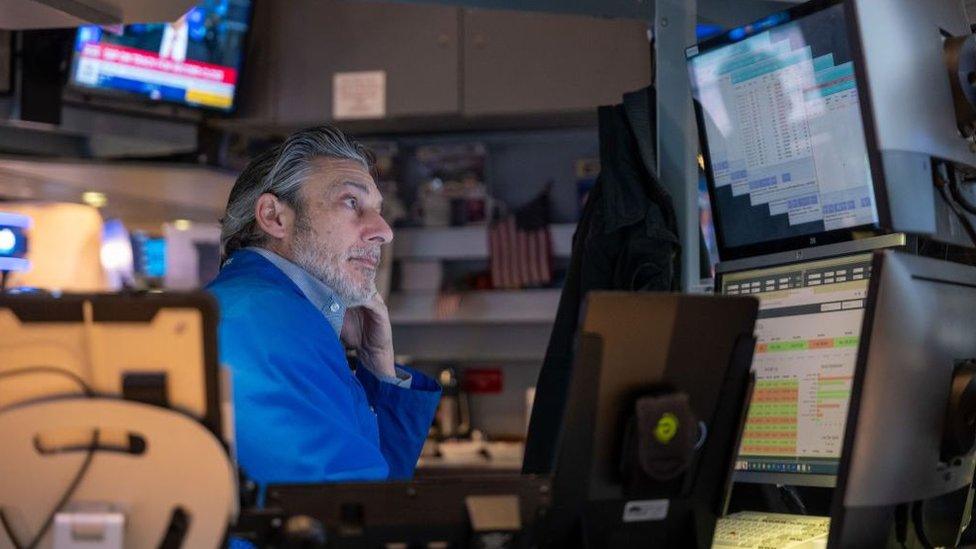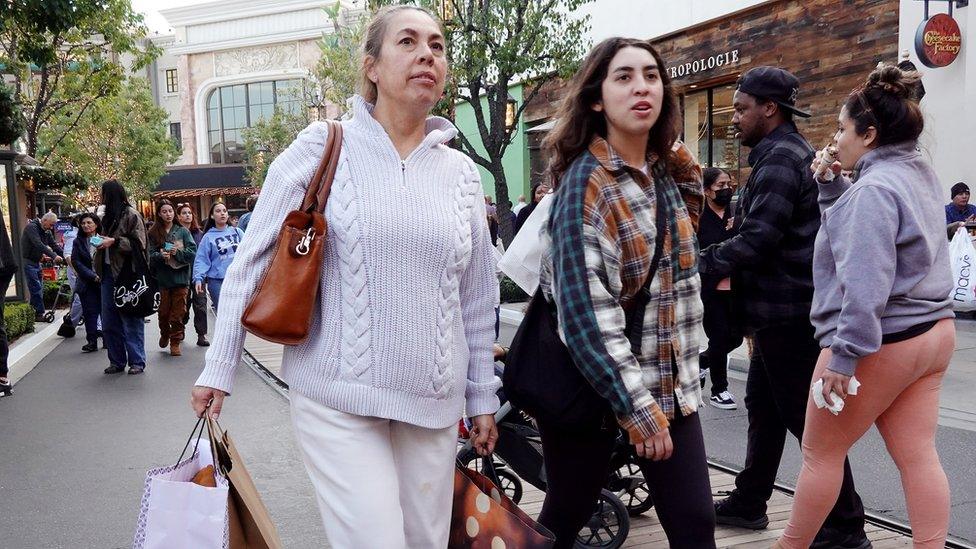US economy surprises with faster than expected growth
- Published

A construction worker with the American flag in the background
The US economy grew faster than expected in the final months of last year, driven by robust household and government spending.
The world's largest economy expanded at an annual rate of 3.3% over the three months to December, the Commerce Department said.
That was down from 4.9% in the prior quarter, but much faster than the 2% many analysts had expected.
For 2023, the economy grew at an annual rate of 2.5%, up from 1.9% in 2022.
The figures cap a year that has been characterised by unexpected economic resilience, even as the US central bank raised borrowing costs sharply and inflation cooled.
"Whichever way you slice it, this report caps a year of stellar economic growth performance," said Olu Sonola, head of US regional economics at Fitch Ratings. "The momentum of economic growth going into 2024 is looking very good."
The figures are a boon for US President Joe Biden, who has struggled to convince the public that the economy remains healthy, as it downshifts from the boom after the pandemic shock.
In a speech in Wisconsin on Thursday, he argued that White House policies, including investments in green energy, roads and other infrastructure, have contributed to the resilience.
"Experts, from the time I got elected, were insisting that the recession was just around the corner," he said. "Well, we've got really strong growth.... We obviously have more work to do but we're making real progress."
Mr Biden said he believed the message was starting to get through.
In recent months, surveys have shown consumer sentiment improving. The stock market is up, petrol prices are down and unemployment remains low.
While the jump in prices since 2019 remains a sticking point for voters, the inflation rate has also eased, falling to 3.4% in December, after soaring to more than 9% in 2022.
California resident Ha Le said she was conscious of no longer being on a constant lookout for the lowest cost petrol.
But the 44-year-old, a corporate worker in the retail industry and a Democrat, said it was still difficult to accept the big jump in grocery and child care prices of the last few years.
"My general thoughts on the economy are that it's not the worst, right? We've recovered somewhat from the pandemic terror, but it's not great," she said.
Many economists had expected households to cut back spending as prices eroded their budgets and for business activity to cool in the face of more expensive borrowing costs, warning of the risks of a downturn, or recession.
But that scenario has not materialised, as high savings left over from the pandemic, an uptick in wage growth, and other government spending provided a cushion. Compared with the fourth quarter of 2022, the US economy grew 3.1%.
On Wall Street, the improving picture has led to speculation that the Federal Reserve, which raised interest rates sharply to fight inflation, might start to reverse course.
But analysts said the strength of the economy portrayed in the report on gross domestic product (GDP) will relieve pressure on the bank to act quickly.
"Those hunting for clues that the Federal Reserve is ready to take an axe to interest rates will be sorely disappointed," said Sophie Lund-Yates, lead equity analyst at Hargreaves Lansdown.
Related topics
- Published20 January 2024

- Published5 January 2024
